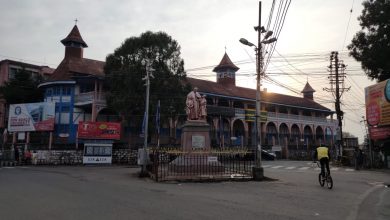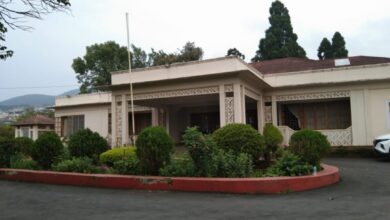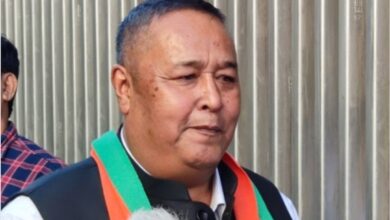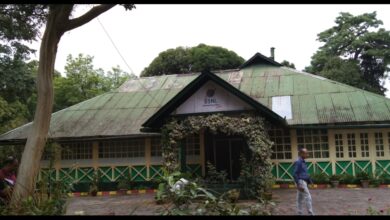Remembering Swamiji’s speech
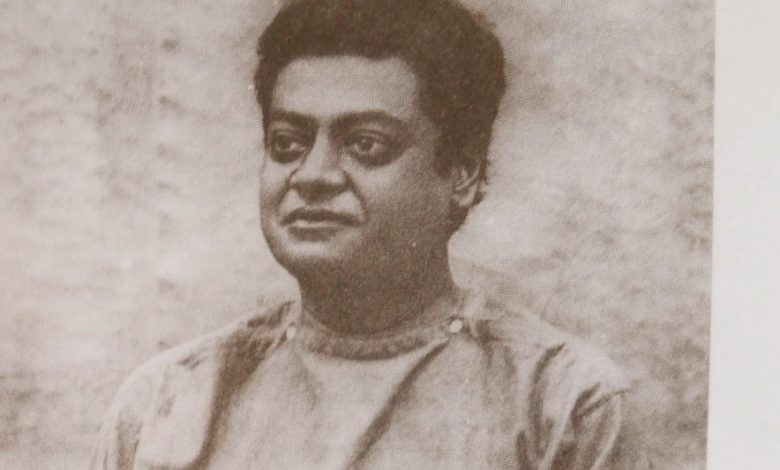
Swami Vivekananda visited Shillong during his last public tour to East Bengal and Assam in the first part of 1901. He was ailing. After visiting Dhaka, Chandranath, Lagonbondha, Dhubri-Goalpara, Gauhati and Kamakhya, Swami Vivekananda became extremely ill.
During his visit to Shillong on April 27, 1901, he delivered a lecture on ‘Ved’ and ‘Sanatan religion’ in Quinton Memorial Hall ( now Vivekananda Cultural Centre) on Thana Road. Through that lecture Swami Vivekananda gave the message to the world that ‘religion is the realisation; to serve humanity is the highest religion’.
After his visit to Shillong Swamiji never recovered from his illness and just after 14 months, on July 4, 1902, Swami Vivekananda left for the heavenly abode.
Shillong was then the capital of Assam Province under the British rule with total population of 9,621. It was cosmopolitan in nature. Many prominent personalities lived there. Among them was Babu Jeebon Roy from the Khasi community. He established ‘Seng Khasi Organization’ in 1899 to save his community’s tradition, heritage, religion and culture.
Local people of Shillong with the help of Sir Henry Cotton brought Swami Vivekananda to Shillong. He stayed in Batti Bazar, Laban, at Rai Bahadur Kailash Chandra Das’s house. On his way to Shillong, Swamiji and other people stayed a night at Noabangla in Umsling.
During his historic visit to Shillong, Swamiji was requested by Chief Commissioner Sir Henry Cotton, Secretary of Quinton Memorial Hall Kailash Chandra Das and other locals to inaugurate the newly renovated Quinton Memorial Hall, which was devastated by a fire. Swamiji accepted the request and after inaugurating the hall, he delivered the lecture in English and Sanskrit languages before the residents of English officials and a large gathering of Indians. Sir Henry Cotton presided over the function.
After the lecture Swamiji’s health worsened. Seeing that Swamiji was ill, Cotton instructed the civil surgeon to render him all possible medical aid. Speaking about his Shillong visit to Saratchandra Chakravarty, Swamiji said, “The Shillong hills are very beautiful. There I met Sir Henry Cotton, the Chief Commissioner of Assam. He asked me, ‘Swamiji after travelling through Europe and America, what have you come to see here in this distant hills?’ Such a good and kind hearted man as Sir Henry Cotton is rarely found. Hearing my illnesses, he sent the civil surgeon and inquired after my health mornings and evenings. I couldn’t much lecturing there, because my health was very bad.”
It is very astonishing that nobody from the Bengali society copied the lecture of Swamiji for future generations. This noble and excellent work was done by the editor of Ri Khasi Press Homru Roy Diengdoh, who was a Christian but after hearing Swamiji’s speech, he became an active member of Seng Khasi movement.
What message did Swami Vivekananda deliver in his last public speech in Shillong? Is it relevant to the modem society? These questions echo in our minds. We are grateful to Homru Roy Diengdoh that he had copied the historic speech of Swami Vivekananda, explained the moments and published that lecture in ‘U Khasi Myenta’, a monthly magazine.
The English version of the speech was published in a Khasi magazine. An excerpt of the report:
‘He [Swami Vivekananda] began by saying that any religion’ without a sacred book cannot stand the test of time. As examples of his thesis, he cited the religion of the Romans, the Greek and others. Though their religions were based on knowledge and discipline, in the long run, they could not survive, for they had no sacred books of their religion, even though they might go astray like the Jews, their religion or faith can never die.
It is the same with the Hindus, he said. Even they are very much misguided by those man-made multifarious teachings. But so long as their Gospel, the Vedas, remains, there is hope…
He exhorted man to enlighten his fellow human beings and help them. Those who could afford to go to school should be provided with facilities to learn extensively, but those who could not should at least learn the alphabet.
The report also said, “…on the night of 27th April 1901, he (Swami Vivekananda) fell ill while he was delivering the speech and has not fully recovered even now.” (The Vedanta Kesari, May 2019).
Malabika Bisharad,
Rilbong

